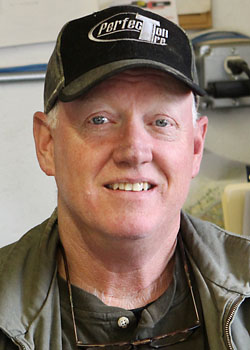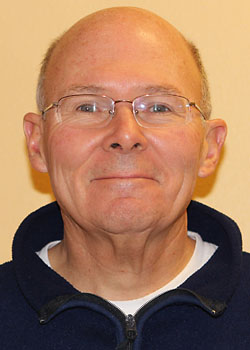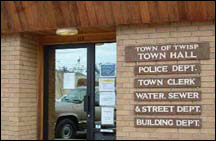home | internet service | web design | business directory | bulletin board | advertise | events calendar | contact | weather | cams

|
Twisp town council members represent 926 town residents. They’re elected as non-partisan officials for four-year terms. The current council voted to serve without pay.  Twisp council member Traci Day Twisp council member Traci Day
Twisp Town Council member TRACI DAY, 46, arrived in the Methow Valley from Bainbridge Island at the age of four with her parents. She graduated from Liberty Bell High School, spent a year at Washington State University, then “escaped” to Switzerland. She and her husband, Saul Labanauskas, returned to the valley 17 years ago. They operate a fire support services business and have been in the home renovation business. Day was co-owner of the former “Sisters” restaurant in Twisp as well as a business partner and cook (renowned for her lamb shanks) at the former Fiddlehead Bistro. Day is in the second year of her council term and came on board after seven years chairing the town planning council. “It was a natural step,” she says of her move from town planning to implementing those plans as a council member. Twisp was the first town in Okanogan County to complete its shorelines management plan, and Day is the driving force behind the town’s effort to build a town trail. She’s also big on sidewalks. They’re a safety issue, she says, so she’s determined to make Twisp safer for pedestrians, especially children who walk from Majors Street along Twisp Avenue and cross Highway 20 by the Twisp Pub to get to the swimming pool and Twisp Park. Day’s mission has paid off: the town recently received a grant to build a sidewalk along that route in 2014. In recent years Twisp often has been in the news for infrastructure failures: leaking roofs and sub-par walls at town hall, leaks at the swimming pool, deteriorating sewer and water systems, a sub-standard fire department and the inadvertent loss of historic water rights that threatens to limit the town’s economic development. “We all stepped into a big mess,” says Day of the challenges facing the council. “We have had a lot of turnover here in Twisp,” she adds, and the institutional memory that comes with continuity has been lacking, as has maintenance of town property and infrastructure. The Washington State Supreme Court’s ruling that Twisp had rested on, and thus lost, its historic water rights after the 1948 flood “ties our hands,” says Day. “We are going to get that solved before our terms are up,” she vows. The council’s vote to pay Mayor Soo Ing-Moody $2,000 a month raised some eyebrows, but Day stresses that Twisp’s experience shows how necessary it is to have someone paying full attention to the details of the town’s affairs. Now, she says, “We have a manager for a multi-million dollar business.” Day’s term expires at the end of 2013.  Twisp council member Clay Hill Twisp council member Clay HillCLAYTON (CLAY) HILL, 36, a deputy Okanogan County prosecutor, was sworn in to fill a council vacancy three months ago. He grew up in Nevada and an Oregon lumber town, and chose to live in Twisp when he took the job in the Okanogan County courthouse because “something about it felt like home,” he says. Hill has worked as public defender in Wenatchee and has done civil litigation while employed by a Mercer Island firm. “I do like the courtroom,” Hill says. But he adds: “I went to law school because of an interest in government.” Volunteering on the town council satisfies an interest in governance that began as a teenager watching C-Span. “I wanted to set deeper roots in this valley,” he adds regarding his council service. Initially he had inquired about joining the planning council, he says, but Mayor Ing-Moody encouraged him to fill a vacant seat on the council. “We need economic vitality,” Hill says when asked about his council priorities. “It’s really about coming up with a vision for downtown.” The lesson offered by Winthrop, population 397, on the importance of attracting visitors is not lost on bean counters in Twisp, population 926. Towns get 1.1 percent of the 7.8 percent sales tax rung up within their jurisdictions, and for tiny Winthrop that adds up to $300,000 annually as opposed to $209,000 for much bigger Twisp. Hill is enthusiastic about the town’s pending application for state economic revitalization funds that, if granted, would be used to erect visitor-enticing entrance archways for the downtown core business district off Highway 20 at Glover Street and Twisp Avenue and to install street lamps, crosswalks, sidewalks and a public toilet at Twisp City Park. In the effort to attract more spending visitors to town, “We’re trying to link our best amenities,” Hill says, adding that to improve its economy, the town needs to focus on “what we have to sell.” One of them is that “It can sell itself as one of the safest small towns,” says Hill. “I review thousands of police reports from all over the county. It’s been my impression that this is the safest, best run town.” Longer term, he says, building a new town hall could be one way to help “to remold the downtown.” He cites the example of the new justice center built in Kent a few years ago. It attracted private investments that revitalized the neighborhood. Hill also is leading the council negotiating team that’s seeking resolution of the impasse over the town’s contract for fire protection services with Okanogan County Fire District 6. His term expires at the end of 2015.  Twisp council member Clint Estes Twisp council member Clint EstesWith six years on the council, CLINT ESTES, 53, is its longest serving member. And with the exception of 10 years logging in Alaska and a stint at Spokane Community College, he’s spent his life in the valley. He’s owned and operated Quality Lube for the past 12 years. “I feel like we should all try to take some time out to serve our community,” he says of his work on the council. Estes says he’s hopeful that the town’s long-term water supply problems will be solved despite the court’s adverse ruling. The Washington State Department of Ecology, which controls water use in the state, “is working with us to find a solution,” he says. His most pressing concern, Estes says, is “running our budget with declining revenues.” Loss of income from the real estate excise tax, lower sales tax revenues triggered by the depressed economy, and the one-year loss of all liquor sales tax revenues due to the legislature’s decision to apply those funds to reduction of the state’s own budget deficit, mean big headaches for little towns like Twisp. And many citizens don’t understand that the council cannot legally use funds earmarked for, say, street improvements to plug holes in the town pool, he adds. Estes reminds that when towns accept state and federal funds, they also accept certain conditions, as was the case when Highway 20 was upgraded through town and a sidewalk was added. “You’re going to get a sidewalk whether you want it or not,” he notes. “I was really not a sidewalk supporter,” he adds, partly due to ongoing maintenance costs such as snow removal. “But if you think about it, there’s nothing really healthier than walking.” The town’s deteriorating infrastructure problems stem from “25 years of not having the money” to repair things, says Estes, who has high praise for the maintenance catch-up efforts of town public works superintendent Howard Moss. “He’s a go-getter.” The Ernest O. Wagner Memorial Pool, gifted to the town by his widow, Kay Wagner, is approaching the half century mark, and the expenses of operating it are not covered by the $15,000 annual donation included in the gift. The cost had been running as high as $20,000 to $30,000 a year, says Estes, though the efforts of Friends of the Pool have brought the town’s expenditures down to $7,000 a year. But in six years, that $15,000 annual gift will vanish, cautions Estes. “It’s not really fair that taxpayers in Twisp shoulder all the cost of the pool,” he argues; residents from all over the valley can use it. The council is exploring whether to ask voters to approve creation of a parks and recreation sub-taxing district with independent authority to operate the pool, according to Estes. Maybe renovating the old, summer-only pool will pencil out as the financially sensible option, he says. “Or do you want to think a little bigger and go year-round?” It may make better financial sense to build a new pool, possibly on the Methow Valley School District’s campus so that student swim programs could be offered during the school year as well, he says. Estes term expires in 2013.  Twisp council member Bob Lloyd Twisp council member Bob LloydBOB LLOYD, 54, was born in Twisp. With his brother, Don Maples, he operates Lloyd Logging Inc., a firm started by his father, Mack Lloyd. Aside from three years at the University of Washington, he’s lived in the valley his whole life. “Everybody needs to pitch in some. It’s my turn,” he says of his council service. “If everybody does a little, nobody has to do a lot,” he adds. Lloyd also served a term on the council in the late 1980s. One of the biggest surprises that awaited him on his return, he says, is the overlay of state and federal regulations that the town now must comply with. There’s more grant money available to towns for various improvement projects, he notes, but there also are more exacting rules and regulations that towns must follow. Previously, the town could do more of its own roadwork in-house, he says by way of example. But now strict regulations about storage of road sealants make that impractical, according to Lloyd. “We need to get more growth in town to help alleviate the economic condition we’re in,” Lloyd says, but adds that he fears the economic downturn, with its negative effects on the town’s budget, may last longer than many people expect. Okanogan County Fire District 6 officials have urged Twisp council members to set in motion an annexation of the town into the fire district for purposes of obtaining permanent, rather than the present contractual, fire services. But Lloyd says this probably will not happen “in the near future.” “It would cost us more,” he adds. “I don’t think the citizens would go for it.” Residents of Twisp as well as those already in the fire district would have to vote to approve annexation. Residents of the fire district who live outside town limits now pay 60 cents per $1,000 of assessed valuation for fire service. Lloyd says that to find funds to build the district’s proposed new fire station in Winthrop, fire district officials may have to ask voters to approve a higher tax rate. But Twisp voters may balk at a tax increase that’s to be used to build a new fire station in Winthrop, he says. And like the other council members, Lloyd argues that Twisp should be given credit in the contract negotiations for providing the district with a fire station, an engine, and water for its trucks. Lloyd’s term expires 2015.  Twisp council member John Fleming Twisp council member John FlemingJOHN FLEMING, 64, grew up in Tacoma and graduated with a journalism degree from Northern Arizona University. He first arrived in Twisp in 1984 as editor of the Methow Valley News. After journalism and broadcast training by the military, he served two tours of duty in Vietnam. He was teaching journalism and graphic arts at North Kitsap High School when, he says, “I realized the kids were having all the fun.” He applied for the Methow Valley News job and got it, but he lasted only two years. “I left the valley because I was lonely and broke,” he says. He met and married his wife, Melodie, and they subsequently lived in Everett and on Lopez Island, where he worked as a construction manager and marketing director. They went to Panama for a couple of years, where he taught construction skills to indigenous people. They also lived in Twisp between 1993 and 1998 before moving back in 2006. But there was to be one more chapter in Fleming’s career that he hadn’t anticipated. A lifelong motorcycle enthusiast, he decided to become certified in motorcycle skills and safety with the idea of teaching these skills part-time. He then spent two years at the U.S. Marine Corps base at Twenty-Nine Palms, California teaching young marines how to ride their motorcycles safely. “The problem was that more marines were killed by motorcycle fatalities than had been lost in the war zone in 2008,” says Fleming - 46 in that year alone. Those who survived Afghanistan came home with the feeling that not only were they “invincible” but with cash in their pockets, he says, “and they bought the fastest thing they could get.” Fleming, who’s been on the council just shy of a year, says he agreed to serve, with some hesitation, at the urging of Traci Day, who he’s known for 30 years. “I’m not sure what I bring to the party,” he recalls telling his wife. She told him it was an “ability to listen, consider and concentrate on the big picture and focus in on what’s really important,” he told Grist. “I think that’s a strength and also a weakness,” he notes. He admits he sometimes gets impatient with lengthy deliberation and that his “tendency to cut to the chase is not always well received.” But he adds that he does understand why it’s important that people around the council table all have a chance to fully speak their minds. Like others on the council, his biggest concern is how to manage the town at a time of declining tax revenues, Fleming says. “I don’t think our job is creating jobs,” he adds. But the council does have a role in making Twisp “a good place to work, to live and to retire.” Fleming says he’d like townspeople to know “what a remarkable group of people” are managing their town. “There are no wallflowers,” he says, but a collection of “intelligent people with articulate voices.” That can set the stage for combativeness, he acknowledges. But at the end of the day, there’s a sense “that we’re still in this together.” 12/6/2012 Comments
|
 All Work and No Pay
All Work and No Pay